Feature
Doing good while doing well: The Cornell Tradition's silver thread
In 1982, entrepreneur and philanthropist Charles F. Feeney '56 started with a simple, powerful idea: help Cornell students help themselves, while also helping others. As The Cornell Tradition celebrates its 35th anniversary and a new $7 million gift from Feeney's Atlantic Philanthropies, the fellowship program continues to flourish.
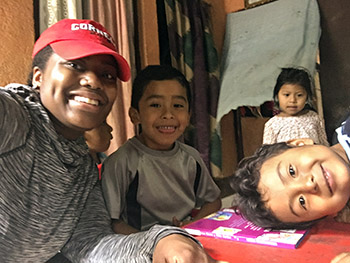
Cornell Tradition fellow Kierra Grayson '19 with children in Nicaragua as part of the Cornell Commitment's annual winter service trip in January. Photo: provided. See larger image
Early on a chilly Saturday morning in December, Cornell Tradition fellows gathered before finals for the Tradition's annual Season of Service, creating gifts to lift spirits among local emergency workers and children in need.
One month later a contingent of Tradition fellows flew to Nicaragua as part of the Cornell Commitment's annual winter service trip. For one week, they helped children by volunteering in schools, and improved food security and sustainability by working on a local farm.
As they fan out to serve others across campus, throughout Tompkins County, in their hometowns and internationally, Tradition fellows – some 500 every year – also maintain satisfactory grades and work on campus to help pay for their education, with their wages supplemented by a Cornell Tradition subsidy.
They are supported by fellowships that offer financial assistance and access to a community that fosters their personal development and leadership skills and connects them to service opportunities.
"The Cornell Tradition remains an innovative and unique model for recognizing students for their commitment to paid work, service and academic excellence," says Suzanne Horning, Cornell Tradition coordinator. "Today it stays true to its founding purpose."
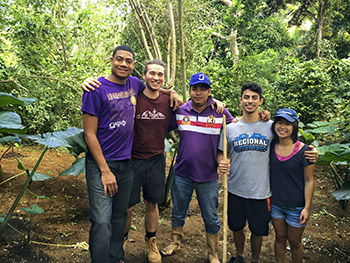
A group of Cornell Tradition fellows at a nature reserve in Nicaragua as part of the Cornell Commitment's annual winter service trip in January. Photo: provided. See larger image
By any measure, Tradition fellows are exceptionally motivated and dedicated. How do these students do it all, and how does the program stay vibrant year after year?
Cornell Tradition fellow Suzannah Bretz '17 jumped into service her freshman year through the Public Service Center's Pre-Orientation Service Trips. As a Gold Award-achieving Girl Scout in high school, she already was committed to service, a criterion for Tradition fellows. Since then she has participated in scores of on- and off-campus projects – from selling benefit raffle tickets at hockey games to volunteering at local charity and community events.
"Even an hour or two can really make a difference to others," she says. "Whether you are a college student or a member of the community, I think it's important to give back."
Bretz has worked as a teaching assistant in four School of Hotel Administration classes and in the Cornell Commitment office, used fellowship funds to expand her summer internship possibilities beyond her small Ohio hometown to those in larger cities, and chaired Tradition's Student Advisory Council. Knowing that it can be challenging to navigate Cornell and meet Tradition fellowship requirements, Bretz launched a peer-to-peer effort for advisory council members to help guide newer fellows.
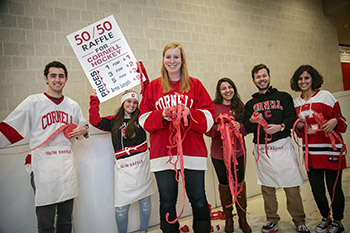
Cornell Tradition fellow Suzannah Bretz '17, center, along with other fellows, sells raffle tickets at a Big Red hockey game at Lynah Rink. See larger image
"What I often tell fellows is that Tradition doesn't really require you to do anything other than what you've already been doing. Tradition just wants to help you continue that while you are at Cornell. … There are not a lot of programs out there that do that."
Bretz speaks enthusiastically about The Cornell Tradition's impact, and her enjoyment is evident – so much so that she is considering ways to build on her leadership experiences with students after she graduates, extending the program's tradition of generosity.
"Cornell Tradition fellows are passionate about whatever it is that they are involved in," she says. "What's so cool is that we can touch both the Cornell community and the greater community, domestically and internationally. Cornell Tradition fellows are motivated to make change."
Horning calls that drive to do good "the silver thread." To her, this thread runs through all 500 Tradition fellows each year across all seven undergraduate colleges.
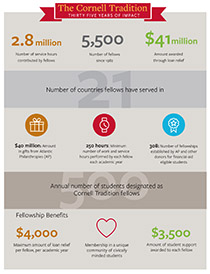
Infographic. See larger image
"The Cornell Tradition is a great expression of the university's land-grant mission – of giving back and being engaged," she says. "These 500 students do great things."
Part of the beauty of the program, she emphasizes, and an important factor in its continuing success, is the Tradition's flexibility and responsiveness, which "allows the program to stay relevant and endure."
In 2004 the Cornell Commitment office offered an additional benefit to Tradition fellowships: student support accounts of $3,500 for each fellow over four years to help students tap new opportunities and pursue unexpected directions through summer internships, international travel for service, or service-related expenses.
Horning notes that some pre-vet fellows have chosen to apply their funds to international travel costs to gain experience working with large animals. One student spent a month nursing a baby rhinoceros in South Africa, an experience that confirmed her career choice of veterinary medicine. Another student traveled to South America to volunteer with an orphanage and discovered he was good at teaching children.
"In this way," Horning says, "The Cornell Tradition pushes boundaries for students, opening doors to unimagined possibilities."
"Looking ahead, we would love to see more alumni engagement," she says. "We know from many Cornell Tradition alumni about how much the program meant to them, and alumni are out in the world doing great things. For our fellows, connecting with alumni, finding mentors, thinking about how they might continue their passion for service while working full time can be very meaningful."
For more information and to get involved, visit commitment.cornell.edu/tradition or contact Suzanne Horning at sah48@cornell.edu, 607-255-8595.
A rock-solid foundation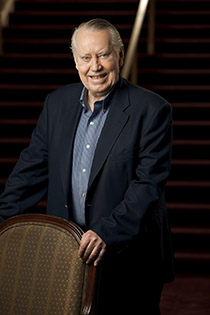 Charles F. Feeney '56. See larger image Atlantic Philanthropies, the limited-life foundation established by the self-effacing, but extraordinarily effective, entrepreneur and philanthropist Charles F. Feeney '56, made its final gift to Cornell in December 2016: $7 million toward the endowment of The Cornell Tradition to ensure its impact endures for future generations of Cornell students. The grant creates the Frank H.T. Rhodes Fund for The Cornell Tradition and expands the foundation's total support for the program to more than $40 million. The conclusion of The Atlantic Philanthropies' grantmaking brings the foundation's total support for Cornell to nearly $1 billion over 35 years, funds that have transformed the Ithaca campus and allowed the university to build Cornell Tech in New York City. Atlantic has granted another $7 billion around the globe, advancing education, research, medical care, human rights, and programs that serve children, the elderly and the disadvantaged. |